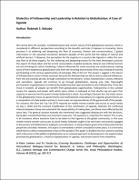| dc.description.abstract | We cannot deny the complex, multidimensional and uneven nature
of the globalization process1 which is considered in different perspectives
according to the benefits and risks it imposes on humanity. Some perceive
it as widening and deepening the flow of economy, finance and communication,
2 global interactions or the assumed connection between peoples
of the world and the fading of natural and artificial barriers.
3 However,
the perception for the majority in a country like Uganda is rather the oneway flow of all these aspects, for this widening and deepening means for
the least developed countries the export of cheap labor and the erratic consumption of global products. Natural and artificial barriers are not
shrinking but rather thickening. Cultural influences for some countries are
unidirectional, making many of them experience globalization only from
the receiving end (mostly of the risks) instead of actively participating in
the various opportunities of exchange. Why is this so? The answer I suggest is the nature of followership in some of these countries because this
followership has led to various external influences, from the pre-colonial
period, through colonialism to the present. Unless followership is active,
effective and exemplary,4 Uganda will continue to go through globalization reaping only risks.
Meaningful participation in globalization is hindered by leadership
that takes precedence over followership. If the two move in tandem, all
people can benefit from globalization opportunities. Followership in this context means the capacity and power with which every citizen is endowed so that she/he can act upon that capacity or exercise her/his power
to keep leadership in check. According to Gautam Sen, the major actors
in the globalization move are governments and multinational corporations.5
In Uganda, governments are a composition of a few leaders and are
in most cases not representatives of the general will of the people. For
instance, the Over the Top Tax (OTT) imposed on mobile money transfer
and access to social media on July 1, 2018 and the constant modification
of the constitution of Uganda, illustrate the conflicting interests between
those entrusted with the responsibility of making laws, and those most
affected by the same laws. The general reaction towards the mentioned
laws suggested displeasure with the decisions, but leaders insisted that
these are important measures. The question is, important for whom? This
is why in all situations where decisions have to be taken to link Uganda
to the global community, in this case mobile money transfer and access to
social media, followers ought to be very keen and actively engaged in discussions and deliberations leading to such decisions. A representative
government demands that the people be consulted. However, this aspect
is overlooked or where consultation takes place, it is a formality which
fails to collect representative views of the people.6
This paper is divided into four sections starting with a discussion of
the pitfalls of globalization as an outward approach to development, the
opportunities promised by globalization, a history of globalization in
Uganda, and lessons learnt from elsewhere. | en_US |


